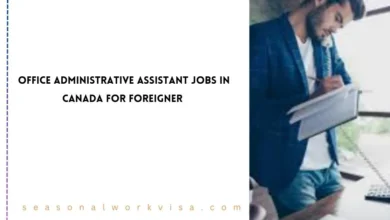UK Invites Skilled Workers with New Terms 2026

The UK Invites Skilled Workers with New Terms 2026 offers full-time employment opportunities for highly skilled professionals seeking to live and work in the United Kingdom. This visa type focuses on attracting talent in sectors that are crucial to the UK economy, from healthcare and engineering to IT and trades, ensuring applicants have a clear pathway to a fulfilling career and long-term stability.
Visa Entry Process and Biometric Residence Permit (BRP):
- For individuals applying for a Skilled Worker Visa lasting six months or more, the UK government issues a 90-day vignette, which serves as an entry permit. Upon arrival, visa holders must collect their Biometric Residence Permit (BRP), a plastic card containing biometric data, from a designated collection point.
- Important Note: If an applicant fails to enter the UK and begin their role within 28 days of their start date, their sponsorship may be revoked, requiring them to leave the UK and reapply. Exceptions may be made for genuine and unavoidable reasons, such as medical emergencies.
- For applicants with short-term visas (less than six months), a vignette is issued instead of a BRP.
Special Considerations for EU, EEA, and Swiss Nationals:
Nationals from the European Union, Iceland, Liechtenstein, Norway, and Switzerland who use the UK Immigration: ID Check app will receive a digital immigration status instead of a vignette or BRP.
Salary and Job Eligibility:
The UK has adjusted salary thresholds to prioritize highly skilled professionals. Salary benchmarks for Skilled Worker Visas have increased significantly:
| Occupation | Minimum Salary |
|---|---|
| General Skilled Workers | £38,700 per year |
| Nurses & Care Workers | £27,200 per year |
| Software Engineers | £33,200 per year |
While these salary thresholds vary by occupation, they represent a significant increase from previous years. This change is designed to attract highly skilled professionals while regulating migration.
Check Also: Unskilled Jobs in UK with Work Visa Sponsorship
High-Demand Professions:
Despite tighter regulations, the UK remains open to certain high-demand professions, which are listed on the Shortage Occupation List:
- Construction & Trades: Bricklayers, carpenters, electricians
- Engineering: Civil, mechanical, electrical engineers
- IT & Tech: Cybersecurity analysts, software developers, data scientists
- Healthcare: Nurses, paramedics, medical radiographers
Professionals in these sectors may benefit from reduced salary thresholds and priority visa processing.
Visa Policy Changes:
Fast-Track Visa Processing
- The UK government has streamlined applications for high-demand sectors, reducing processing times for healthcare, technology, and engineering professionals.
Longer Visa Validity & Settlement Opportunities
- Skilled Worker Visa holders can now stay for up to five years, with a pathway to Indefinite Leave to Remain (ILR), allowing eventual British citizenship eligibility.
Restrictions on Family Members for Care Workers
- Unlike other Skilled Worker Visa holders, care workers can no longer bring family members under dependent visas.
Access to Healthcare & Pension Benefits
- Visa holders are entitled to use the National Health Service (NHS) and may qualify for workplace pensions if eligible.
Process for UK Invites Skilled Workers with New Terms?
To secure a Skilled Worker Visa, applicants should follow these steps:
- Check Eligibility: Verify your profession on the UK Shortage Occupation List and ensure you meet salary requirements.
- Secure a Job Offer: Obtain a Certificate of Sponsorship (CoS) from a UK employer licensed to sponsor visas.
- Gather Required Documents:
- Passport or travel document
- Job offer letter and CoS reference number
- Proof of English proficiency (e.g., IELTS test results)
- Financial documents showing sufficient funds (if required)
- Submit the Online Application: Apply via the UK Home Office website and pay the necessary fees.
- Attend a Biometric Appointment: Provide fingerprints and a photograph at a visa application center.
- Receive Visa Decision: Processing times vary but may take three weeks for standard applications and one week for priority processing.
For full details, visit GOV.UK: Skilled Worker Visa.
Useful Links & Resources:
- UK Skilled Worker Visa: Official Guidelines
- Shortage Occupation List
- Indefinite Leave to Remain (ILR) Guide
Conclusion:
The UK Skilled Worker Visa 2026 offers skilled professionals a clear path to work, live, and grow in the UK, with updated salary thresholds and priority for high-demand roles. Applicants can access healthcare, pensions, and a route to permanent residency, making it a long-term opportunity. While care workers face some family restrictions, the visa ensures a supportive, rewarding experience for most skilled workers.
Frequently Asked Questions:
What are the key changes to the Skilled Worker Visa?
The standard minimum salary is £38,700, but certain roles (e.g., nurses, software engineers) have lower thresholds.
What is the minimum salary requirement for a Skilled Worker Visa?
The UK has increased salary thresholds, streamlined visa processing for high-demand sectors, and restricted family sponsorship for care workers.
Can I bring my family with me on a Skilled Worker Visa?
Most Skilled Worker Visa holders can bring dependents (spouse and children), except for those in the care sector, who now face restrictions.




